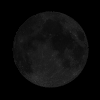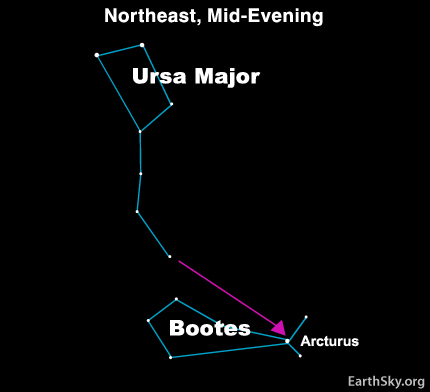Courtesy of EarthSky
A Clear Voice for Science
Visit EarthSky at
www.EarthSky.org [1]
 [2]
[2] [3]Now is a perfect time to look outside in the evening and learn a playful phrase useful to skywatchers. Scouts learn it. Grandparents teach it to kids. It was one of the first sky tools I learned to use in astronomy.
[3]Now is a perfect time to look outside in the evening and learn a playful phrase useful to skywatchers. Scouts learn it. Grandparents teach it to kids. It was one of the first sky tools I learned to use in astronomy.
The phrase is: follow the arc to Arcturus.
First locate the Big Dipper asterism in the northeastern sky in mid-evening, maybe around 9 p.m. Can’t find the Big Dipper? Look ahead to our chart for April 6 [4].
Once you can see the Big Dipper, notice that it has two parts: a bowl and a handle. Then, with your mind’s eye, draw an imaginary line following the curve in the Dipper’s handle until you come to a bright orange star. This star is Arcturus in the constellation Bootes the Herdsman. Arcturus is known in skylore as the Bear Guard.
Arcturus [5] is a giant star with an estimated distance of 37 light-years. It is special because it is not moving with the general stream of stars in the flat disk of the Milky Way galaxy. Instead, Arcturus is cutting perpendicularly through the galaxy’s disk at a tremendous rate of speed . . . some 150 kilometers per second. Millions of years from now this star will be lost from the view of any future inhabitants of Earth, or at least those who are earthbound and looking with the eye alone.
However, for now Arcturus is one of the easiest stars to find, using the Big Dipper as a guide. Try it, on a lovely spring evening soon.
Give me five minutes; I’ll give you Saturn [6]
By EarthSky [7]
Astronomy Picture of the Day from NASA/JPL [8]
EarthSky: Space [9]
CHANDRA Photo Album [10]
U.S. Naval Observator Astronomical Information cente [11]r
Universe Today [12]
StarDate Online [13]
Sky and Telescope [14]
National Geographic [15]
Space Com [16]
Simostronomy Blog [17]
Amazing Space [18]
The York County Astronomical Society [19]
Scope City [20]